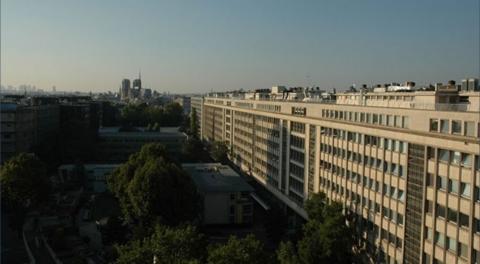
Sorbonne University at the helm of "the most important social housing operation underway in Paris."
The President of Sorbonne University, Jean Chambaz, has just signed a framework agreement for the creation of a university residence on the Pierre-et-Marie-Curie campus, which he is calling "the largest social housing operation underway in the city of Paris." The Paris real estate authority and the Department of Public Finances for the Paris are also signatories. President Chambaz told AEF Info (a French higher education press outlet) in an interview on April 14, 2021 that this "major series of real estate operations" launched by the University after the overhaul of its multi-year real estate strategy plan.
Sorbonne University has signed an agreement with the City of Paris' real estate body for the construction of a 565-unit university residence on its Pierre-et-Marie-Curie campus, along rue Cuvier, by renovating the Cassan F building, which is currently unoccupied. This residence is intended for students and young researchers, young professors and university staff who need temporary housing before they can find a place to live in the Paris region, and some emergency housing will be reserved for staff who are in social distress.
A residence hall, student living spaces, a medical clinic, a waste disposal center

"We have accelerated a number of projects that have been in the works since the merger between UPMC and Paris-Sorbonne," he explains, recalling the "large series of real estate operations" launched by Sorbonne University.
The university residence will be financed by the PLUS funds of the city of Paris, based on a concession that the University gives to the city of Paris’s real estate body over a period of 40 to 50 years. "The city will be able to build these social housing units, including spaces for student life shared with the City of Paris's student initiatives center, some additional facilities and a non-hazardous waste disposal center," said the President. The residence will also house a medical clinic.
A series of building works will reconfigure the campus
A new university restaurant will also be constructed under the other "Cassan Bar" building on the Quai Saint-Bernard, along with an administrative restaurant in the interior garden of the Pierre-et-Marie-Curie campus thanks to an agreement signed with Crous agency for student housing and meal services. The current restaurant at the corner of rue Cuvier and Quai Saint-Bernard will be replaced by a gymnasium with bleachers and a residence for international researchers.
The University is also renovating the part of the Cassan bar on the Quai Saint-Bernard that houses the biology department and the sports department. Sorbonne University has invested more than €25 million over the past ten years into this renovation, and is reinvesting an additional €10 million in the hope that regional funding will make it possible to finance a new phase for compliance and energy renovation.
Finally, the city plans to redefine the northern and eastern edges of the campus by pedestrianizing and greening Rue Cuvier and redeveloping the Quai Saint-Bernard. In addition, in the fall, construction will begin on Paris Parc, Sorbonne University's "window to the socio-economic world," as President Chambaz has described it.
"All of this work will have an impact on the Pierre-et-Marie-Curie campus," the University President notes. “A system for coordinating the work, anticipating it and updating our public will be put in place so that activities can continue without too much disruption.”
Project-by-project financing
"This major real estate investment program has been made possible by the University's healthy budget," says President Chambaz. Each of the projects has been financed on an ad hoc basis:
- The €60 million investment in Paris Parc is based on subsidies from the city, the regional department, the state department and a loan;
- The university restaurants benefit from the remaining budget from the State on the Jussieu campus, with funds from Crous and Sorbonne University;
- The University residence on rue Cuvier will receive €100 million in funding from the City of Paris's real estate body;
- The Censier project will be financed by the sale of the University's own property.
Major real estate operations on other sites
These works are being carried out in parallel with the ongoing renovation of the Faculty of Medicine buildings on Boulevard de l'Hôpital. As part of the regional funding, which is coming to an end, a "living lab" focused on the autonomy of the elderly or disabled in their personal and professional environment is being built at the Charles Foix Hospital.
The University is also using its own funds to renovate the Institute of Iberian Studies on rue Saint-Jacques. With funding support from the region, Sorbonne University has requested the renovation of the Institute of Art and Archaeology shared with Pantheon-Sorbonne University (Paris-I), "which is in a very bad state", reports Jean Chambaz.
Finally, the University is continuing to renovate its marine stations in Roscoff, Banyuls and Villefranche-sur-Mer, with the strong support of local authorities as part of their regional support in Brittany, Occitania and, we hope, in Provence-Alpes-Côte d'Azur.
Replenishing the real estate capacity
"The housing capacity of university residences is not in line with the number of students and the cost of accommodation,” according to Jean Chambaz. "While our project will not solve the problem of student housing—Sorbonne University has 55,000 students—it can contribute to the need."
Sorbonne University is "the main partner of the Cité Internationale Universitaire de Paris for the number of rooms reserved for international students. The University is preparing a platform "to better accompany and guide students through the maze of housing solutions.”
The president of Sorbonne University reminds us that "during the first lockdown, 50% of Crous residences were empty, but 50% remained occupied, and many students are now struggling because they were funding their rent with part-time jobs that no longer exist.
